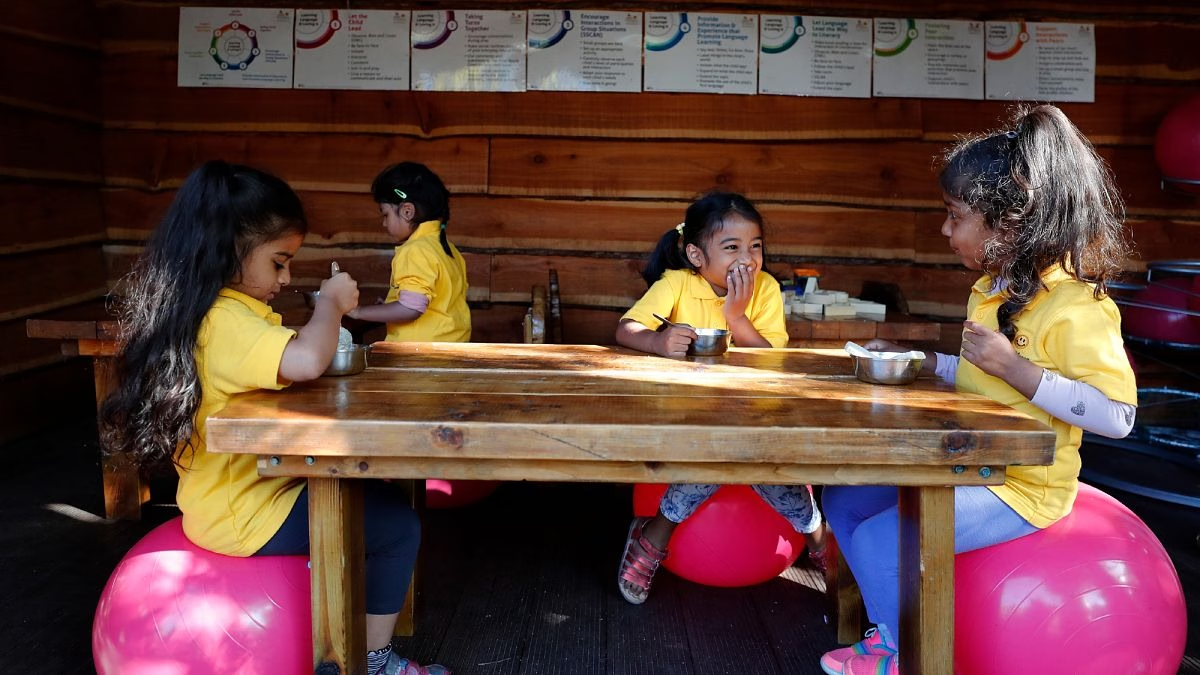<
div style=”–widget_related_list_trans: ‘Related’;”>

ADVERTISEMENT
Early childhood education and care play a crucial role in determining success in school, work, and life. The EU asserts that every child deserves access to affordable, high-quality early education and care, and that a child’s future should not be influenced by family background.
Despite this, childcare expenses continue to weigh heavily on many European families. While some countries offer robust support for families with young children, others require parents to dedicate a substantial portion of their income towards nursery care.
How do childcare costs differ across Europe? What is the cost of care for families before and after benefits are applied? What portion of household income is allocated towards nurseries or day-care centers?
What is covered by childcare cost and benefit data?
Childcare costs and benefits vary across Europe, according to the OECD. The data pertains to center-based care, which refers to childcare services provided outside the home in licensed facilities, such as nurseries, day-care centers, crèches, playschools, and parent-run groups, offered on a full or part-time basis.
Cost for families with two children
OECD statistics are based on families with two children aged two and three. Net childcare costs represent the total gross fees minus childcare benefits, adjusted for changes in taxes and other benefits. Gross childcare costs are defined as the fees paid by parents after public subsidies to providers, but before any discounts based on family circumstances. Childcare benefits may be provided in the form of allowances, tax breaks, fee rebates, or increased entitlements.
As of 2023, the annual gross childcare costs for two children within the EU range from €552 in Germany to €39,229 in the Netherlands. Including EFTA countries and the UK, Switzerland leads the list with costs reaching €64,211.
Gross childcare costs also exceed €20,000 in Luxembourg (€30,254), the UK (€27,071 or £23,546), and Ireland (€20,533).
The lowest costs are observed in Germany (€552) and several other countries where fees are below €2,000: Bulgaria (€884), Hungary (€1,007), Austria (€1,638), Czechia (€1,843), Croatia (€1,911), Lithuania (€1,935), and Romania (€1,945).
Among Europe’s five largest economies, the UK imposes the highest childcare costs, while Germany is the most economical. Italy (€10,032) also incurs significant costs, France is in the middle range at €7,717, and Spain has the second-lowest cost at €2,452.
The Nordic countries are positioned near the median, with Iceland at €5,014.
Net childcare costs depend on family income and the number of earners
Childcare support varies based on income level and the number of earners. Single parents and one-earner families typically receive more assistance than two-earner couples.
In certain countries, both single and two-earner families pay the same, usually in situations where childcare costs are minimal—typically under €2,000.
When childcare costs are high, the discrepancy between single-earner and two-earner families becomes pronounced, as seen in Switzerland, the Netherlands, France, Belgium, and Cyprus. Single parents and one-earner families receive significantly more in benefits.
Net childcare costs for single-earner families range from zero in Greece, Italy, and Malta to €10,200 in Switzerland, followed by the UK (€9,991 or £8,690) and Ireland (€8,409).
The Netherlands (€6,563), Belgium (€5,524), Finland (€4,539), and Norway (€4,177) are among the most costly for single-earner households. No other country exceeds €4,000. Costs are below €2,000 in 18 of 31 countries, with 10 countries observing no costs or costs under €1,050.
For two-earner households, net childcare costs significantly increase in many countries. Switzerland remains the most expensive at €27,551, followed by the Netherlands (€15,915). Costs also exceed €10,000 in the UK (€13,662 or £11,848), Ireland (€13,056), and Belgium (€11,186).
In most countries, net childcare costs for two-earner couples are below €2,500. In Italy and Malta, they remain at zero, followed by Germany at €430.
France stands at €6,523, while Spain is much lower at €2,452.
All figures are based on households earning 100% of the average national wage, with either one or two earners.
How much of your income goes to childcare?
The most relevant indicator for understanding nursery affordability and making international comparisons is the percentage of salaries allocated towards net childcare costs.
The UK records the lowest share at 18%, followed by Slovakia (17%) for single parents or one-earner families.
In five additional countries, this share reaches 10% or higher: Ireland (14%), Czechia (12%), the Netherlands and Romania (11% each), and Switzerland (10%).
Romania ranks sixth by share of income, but its nominal costs place fourteenth (€1,945). This illustrates that lower average wages can intensify the burden on households.
In most European countries, this percentage is 6% or less, including Germany (1%) and France (6%).
For two-earner couples with two children, this figure varies from zero in Malta, Bulgaria, and Italy to 28% in Switzerland. In Cyprus and the Netherlands (26% each) and the UK (25%), at least a quarter of household income is dedicated to childcare.
In 19 countries, childcare accounts for 9% or less of average wages, including Spain (
Source: https://www.euronews.com/business/2025/08/24/nursery-and-creche-how-much-do-families-spend-on-childcare-across-europe





